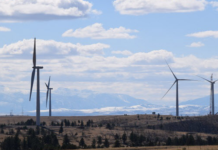Acciona's 123 MW Red Hills Wind Farm is the first in the U.S. to be validated and registered under the voluntary carbon standard (VCS). Red Hills is a wind farm built in Oklahoma, a state with no renewable portfolio standard, and therefore no possibility for generating compliance renewable energy certificates.
The VCS program provides a global standard for approval of credible, voluntary offsets. TerraPass has contracted to purchase a portion of the voluntary carbon units (VCU) from the Red Hills project, which it will retire on behalf of its customers. Using the UNFCCC Clean Development Mechanism methodology for renewable energy projects, Red Hill's wind power is calculated to displace 0.67 metric tons of coarbon dioxide for each megawatt-hour produced.
Acciona's Red Hills Wind Farm is the first U.S. renewable energy project to be validated and registered according to the same stringent methodology, which governs renewable energy projects registered under the Kyoto Protocol's flexibility mechanisms.
The VCS was developed to standardize and lend credibility to the voluntary offset market. Specifically, the VCS has created a trusted and tradable voluntary offset credit, the VCU. Accreditation from the VCS ensures a clear chain of ownership over voluntary offsets and prevents them from being used twice.
SOURCE: Acciona Energy



